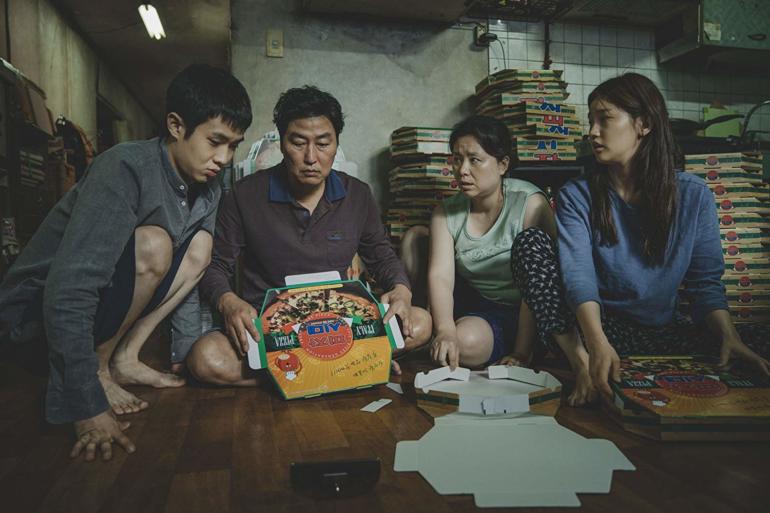2019 South Korean film Parasite, directed by Bong Joon Ho, has been at the epicenter of cinematic discourse owing its complex social commentary rife with symbolism, beautiful and enigmatic cinematography and latent political message. The film is a black comedy riddled with numerous cinematic metaphors, symbols, camera work, and style to emphasise one of South Korea’s most pervasive social problems: class war and economic inequality.
The film tells the tale of the hard-pressed Kim family and the wealthy Parks through the lens of a vicious class war. One of the main characters, Kei-woo is given the opportunity to teach the Parks’s teenage daughter by his close friend, Min-Hyuk. The family is gifted a scholar’s rock by Min-Hyuk as a symbol for good fortune and prosperity, which, coincidentally, becomes one of the most lasting and enduring symbols in the movie and is a complex paradox for both the hope during the first half of the movie for the family and the family’s steady downfall during the second half.
The film is a black comedy riddled with numerous cinematic metaphors, symbols, camera work, and style to emphasise one of South Korea’s most pervasive social problems: class war and economic inequality.
By assuming aliases and eliminating the Parks’s household staff through trickery and lies, the rest of the family is soon able to secure work at the Parks, where they play the roles they are assigned, attaching and integrating themselves very much like real parasites. Kim Ki-taek, the father, becomes the family chauffeur, the mother Chung-sook assumes the role of the cook, while the daughter Ki-Jeong becomes an art therapist for the Parks’s son who is presumably mentally ill after a traumatic incident. The family soon discovers the presence of Geung-Say, the husband of the old housekeeper, Moon-gwang hiding out from loan sharks. The ensuing struggle between these two families ultimately ends with a horrifying reckoning, loss, and hard lessons learnt about family, strife, and social ignorance.
An Important Cinematic Purpose
Parasite has taken on a larger than life form since winning the Palm d’Or last year not simply for its diversity and achievement, but also for the universalisation of the class war and class struggle message and the way it recalls the multiple dimensions to income and wealth inequality. The class battle is portrayed as an unending and unavailing battle for the characters, both in metaphorical and figurative senses. Most importantly, the potency of Parasite’s innate message goes beyond the limits of diversity talk in this year’s awards season, as it sheds light on social and income inequality through a different lens, extending beyond traditional narrative and direction.

Moreover, the film’s constant metaphorical allusions to Native American culture and imagery serve as a deliberate method of gross appropriation where we disregard the voices of the silenced and marginalised individuals, groups and communities, which is not unlike the similar herculean problem that the Kims also struggle with throughout the course of the film, especially when the Parks complain that the Kims ‘smell’ a certain way, how they should not ‘cross the line’, and how they constantly make assumptions about the poorer socioeconomic class throughout the film, completely ignoring and disregarding the complex social realities of poverty in their city. The film employs a type of hyperbolic symbolic violence in the end when we witness the death of Mr Park at the hands of Ki-Taek to hint at the harsh equally violent struggle and clashes between the upper and lower classes in society.

Most importantly, Bong Joon Ho’s Parasite carries it with an important and heightened social warning, as it is a cautionary tale that warns us against the vices of collective social disenfranchisement and disillusionment. The characters in the film continue to be ruled by fear, anger, and malice, which culminate in the bleak dystopia that is highlighted in the penultimate scene in the movie, where anarchy and order unfold. Ki-Taek brutally stabs Mr Park, Geung-Say kills Ki-Jeong, and Choong Sook, in turn, fatally wounds Geung-Say with a chicken skewer.
Also read: Film Review: Fire —On Queering Love And Beyond
Though the concluding montage does suggest a ray of hope on the Kim family, it is shielded and dimmed with a grim turn back to reality where Kei-woo is writing a parting letter to his father who has now taken Geung-Say’s place in the underground basement of the Park house as he is still hiding out from the police after his conviction of Mr Park’s murder. It proves the illusory and often unavailing seek that poor households have to face as they hope for a brighter future but have to grapple with the social hindrances and immobilities that belie their dreams.
Additionally, Parasite also presents an unbiased account of class struggle by bringing all the characters into the cycle of conflict and adversity by pitting them against one another, making it near impossible for the audience to root for a specific ‘side.’
Additionally, Parasite also presents an unbiased account of class struggle by bringing all the characters into the cycle of conflict and adversity by pitting them against one another, making it near impossible for the audience to root for a specific ‘side.’ In addition, the usage of stairways and levelling is a delicate metaphor that serves to highlight just simply how entrenched inequality between the classes continues to be in society.
The Parks live on top of a hill while the Kims need to descend the hill down multiple stairs all over the city to reach their downtrodden neighbourhood. The storm that destroys their home at the end of the film signifies the intensifying class war that ultimately leads to the destruction of all our main characters and the imbalance that is caused as a result of the lies and deception that has befallen all the three families in the movie. The lie that the Kims try to sell is finally unravelled and undone along with their home all their personal belongings.

In mainstream Hollywood and western films, complex issues like race and class, largely ignored until recently, are still majorly confined to western societies and rarely examine Asian countries and other societies. Parasite is ushering in a new wave that alters the current cinematic appreciation, performance and experience by bringing new flourishes and examinations in its own way, where we are able to understand the different social intricacies and realities in different societies. Call it the second phase of the transnationalism genre if you will, but there is definitely greater cultural depth and immersion that is being acknowledged and even celebrated when such films finally come to the forefront as we see them knitted in our current movie and pop culture fabric.
What Is in Store Post-Parasite?
Parasite has inarguably grown to be a massive cinematic phenomenon, especially as it has brought foreign films to greater prominence and received a lot of critical acclaim in the process. In his speech at the 2020 Golden Globe Awards, directed by Bong Joon Ho explained, “Once you overcome the 1-inch-tall barrier of subtitles, you will be introduced to so many more amazing films”. In another interview, he said, “I think we use just one language — the cinema”. On that note, for once, the Academy Awards may be going beyond tokenism and perceiving foreign films through the eyes of cultural exoticism or conventional classifications and guises of ‘diversity’ and ‘representation.’
Bong rebuked how Hollywood often put non-English films into homogenous categories without ever acknowledging the individual diversities, authenticities, and stories in the making of different films. For instance, the film was not eligible for any of the Golden Globe best film category in both musical and comedy, as well as drama.
Also read: The Oscars Did It Again! It Chose To Overlook The Women Directors
The Parasite wave, in turn, follows the similar wave of Alfonso Cuarón’s 2019 “Roma,” which nearly won the top prize at the 2020 Academy Awards. In recent years, Hollywood has attempted to greatly diversify its membership ranks and extend its outreach and inclusivity to appeal to larger and wider audiences.
Featured Image Source: What’s On Netflix
About the author(s)
Shivani is currently a political science undergraduate student enrolled at Sciences Po Paris. She hopes to embark on a career in investigative reporting and journalism. Shivani is a lover of coffee, obscure films, sitcoms, political podcasts, and siestas. In her free time, she enjoys writing and curating her next Spotify playlist.



